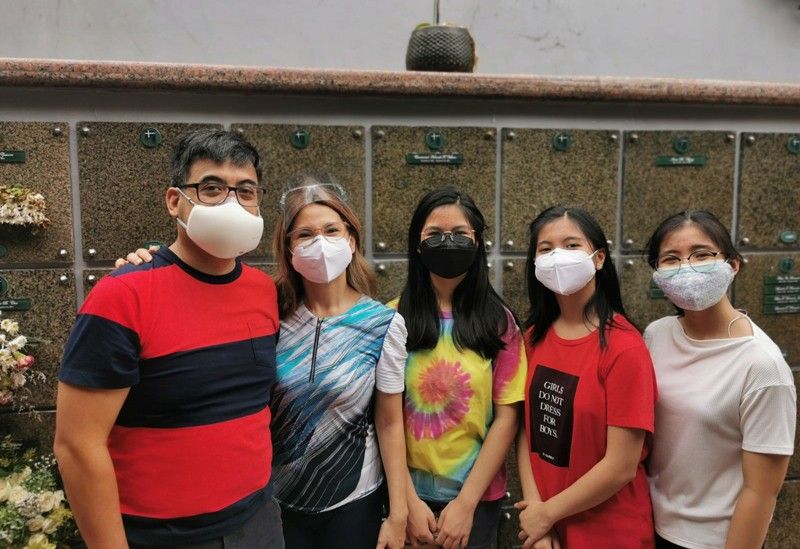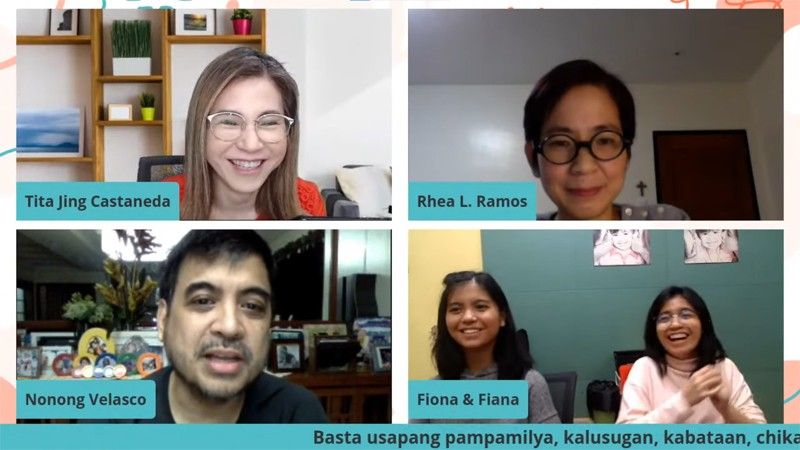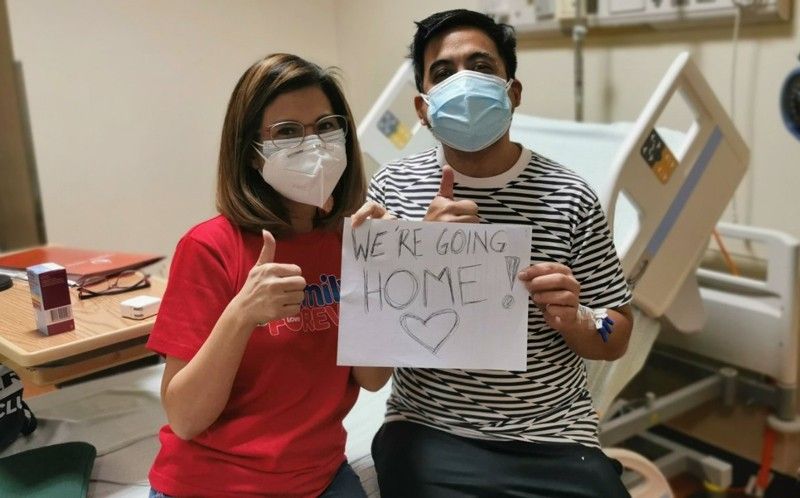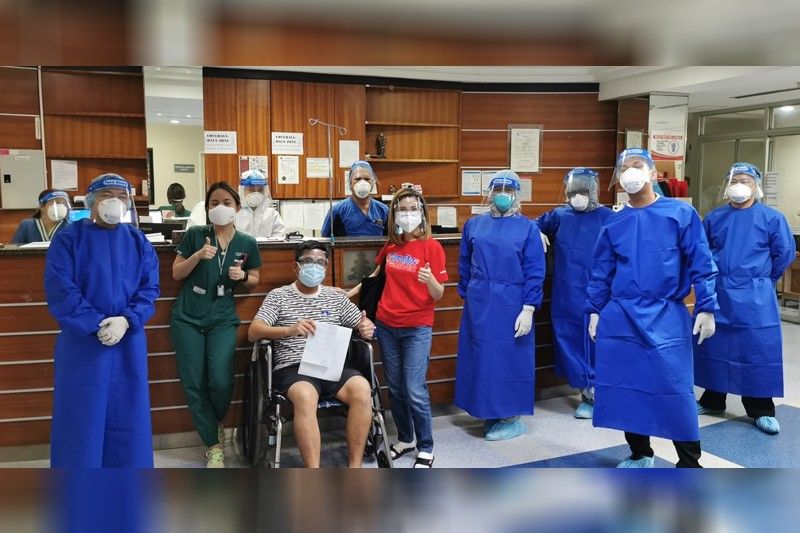How our family survived COVID-19 (Part 2): Dealing with the mental stress


Our COVID-19 journey was probably not as different for some households who have been infected by the virus, but still, experiencing it first hand is such a harrowing incident for all of us that we deem it life-changing. We lost our Kuya Kenn because of COVID, my husband Nonong was confined at the hospital because of severe COVID, and the entire household, including me, were infected by the virus.
Our family is still grieving the loss of my beloved brother-in-law but at the same time, we are grateful that Nonong is alive and the kids and I are recovering smoothly. Aside from the medicines that we had to take, what helped us recover physically, mentally, and emotionally are the undying support of our family and friends who prayed with us and helped in kind by way of giving us meals or care packages that warmed our hearts and bellies. Our family held on to God and never did we thought of letting go for HE gave us more reasons to stay calm, hopeful, and faithful. To read more about our journey and how Covid-19 affected our household, click this link to take you to my article.
In our Pamilya Talk episode where I interviewed my kids Fiona and Fiana, my husband Nonong, and Child Psychologist Dr. Rhea Lopa- Ramos, we talked about how we dealt with the most challenging things that we’ve encountered in our lives and how to move forward from it. We would like to share her advices with you, as part of our family’s way of trying to heal -- physically and mentally.
Getting your facts right
There are different levels and a great amount of stress that you’d be dealing with once you’ve encountered COVID. In our case, we’re still mourning the loss of a loved one. Kuya Kenn was very close to our family and breaking the news to our children was something that we had to do carefully so as not to give our daughters additional stress. “What's important is you give them the truth and that you're honest with them,” suggested Dra. Rhea when talking to your kids regarding the family’s situation in these trying times. She also recommends not to overwhelm them with details and information that they might overly think about.

Reassurance that you’ll be there
"The mere fact na alam kong andyan ka, na kaya kita kausapin, napakalaking relief noon," says Nonong. He shared that his strength and peace of mind came from the fact that unlike other hospitalized COVID patients without any family members taking care of them, I was with him physically. It was very important to him that he had someone to be by his side during that time that he was in physical, mental, and emotional anguish. His body really took a beating due to of COVID and losing his kuya because of it doesn’t make it easier for him to cope emotionally. That’s why I said that it was a blessing that I was able to spend time and tend to him during his stay at the hospital. I really wouldn’t have it any other way.
He also looked forward to attending the daily online healing masses dedicated to him and our family. Knowing that there are people praying for him assured him that there’s an entire community of COVID warriors fighting with him.
Making your loved ones feel that they are not alone, that no matter what happens, you’re in this with them is such a huge help for their mental stability. “In any illness, the mind has an impact in our physical well-being,” according to Dra. Rhea. COVID is a very lonely disease because it physically distances you from people you love, therefore constant communication, even just a quick “Hi,” would be very valuable for boosting positivity to those who will be needing it.
“May sense of guilt sa simula, kasi sa akin nanggaling (yung COVID). Roller coaster of emotions. I’m the breadwinner, kailangan naman natin magtrabaho; nasa public service tayo. I wasn’t so much worried about myself, yung kalagayan ng mga anak ko, ng pamilya ko, and everybody else was added pressure sa akin. Kasi hindi naman makukuha ng pamilya yan kung hindi dahil sa akin,” says Nonong. Dra Rhea also reminds us that it’s important to assure Nonong -- or whoever had the virus first in your household -- that it’s not their fault. No one should be blamed for contracting it, especially if you know that they’ve been taking extra precautions not to get or spread the virus. It’s important to remind your loved ones who contracted the virus that they should not feel guilty and that they’re not reckless. There are just circumstances, like in Nonong’s case, that working face to face with people is unavoidable; more susceptible on getting sick.


Reinforce safety protocols
One thing that we have to take into consideration is that no matter how careful we are, COVID is very unpredictable and sneaky. Sometimes, even though people are in their healthiest state, COVID can take a bad turn that your body would have a difficult chance fighting it. It’s beyond our control who will get infected by the virus and who would succumb to it. We have to take extra care of ourselves and we still remind our entire household to wash their hands and to wear their masks properly.
Grab the chance to get vaccinated, it really helps. Nonong’s doctors said that if he hadn’t been fully vaccinated, there’s a possibility he wouldn’t have made it. This pandemic is far from being over and with God’s grace, we pray that we won’t ever have to face it again. Now that we’re all on the road to recovery, we are trying our best to have a sense of normalcy again in the household by connecting with the kids and being optimistic.
Be attuned and observant
Dra. Rhea mentioned during the interview that not all express what their feeling through words. Sometimes, our family members articulate their emotions through their behavior. So we have to be perceptive that if we think something is amiss or worrisome, we can talk to them about it. During the interview, I asked my daughters Fiona and Fiana how they felt finding out that they had COVID, that their uncle passed away from it, and that their father had to be admitted. “Nahirapan akong magfocus sa subjects namin,” Fiona admits. She also mentioned that finding out that her uncle has passed away was unexpected. “I was just trying to think positive that dad’s COVID won’t turn out the same way as what happened to Ninong Kenn,” Fiona adds regarding her father’s condition at the hospital. Fiana shared the same sentiments of her sister, adding that she felt overwhelmed finding out about the death of his uncle.
It’s also important to give your loved ones the space that they need in order to process everything. Allow them to grieve and be alone, but make sure they’re not feeling lonely. "When your child is quiet, just respect that. We all have a drive to understand our emotions but we have different ways of doing that. Sometimes we need to let them be and let them feel their emotions. But we also should let them know that you're there to help them," says Dra. Rhea.
Keep the faith
Having a good support system within the household, family, and friends is essential and having formidable trust in God makes things more assuring. Prayers are comforting. Our faith and spirituality will help us cope and these are the anchors that we also need to strengthen. It’s really the community of love and faith that will carry you through tough times.
There was a moment that I asked myself why these things were happening—a death in the family, Nonong getting extremely sick, and everyone in the household catching the virus. A psychologist friend told me that I am what they call a wounded soldier. We, survivors, are. My job is to communicate with people, sharing with them knowledge from my guests and me through the different channels that I’m a part of. Having been able to survive this plight, I can empathize more with the people who have been struggling and dealing with the same predicament that we’ve dealt with --- allowing God to use me as a vessel to give inspiration and hope that we will all get through this. Always remain grateful for the generosity of God, relatives, and friends, and try to return the favor in however way you can.
If there’s an important thing that I’ve learned with our journey is that life is so fragile, let’s try to live it the best way we can. What we’ve gone through was terrifying but like what my husband said, it shouldn’t dictate the way we live and we shouldn’t allow ourselves to live in fear. Dra. Rhea also mentioned that there’s something called Post Traumatic Growth wherein we come out from trials and adversities with progress and positivity. That’s what we’re aiming for in the family; our goal. Amidst our losses, we’ve found a new appreciation for life and a sense of gratitude.
* * *
Watch Pamilya Talk on Facebook, YouTube, and Kumu (@JingCastaneda – 5:30-7:00 p.m. Monday, Tuesday & Wednesday). You can also follow my social media accounts: Instagram, Facebook, YouTube, Twitter and Kumu. Please share your stories or suggest topics at editorial@jingcastaneda.ph.




















